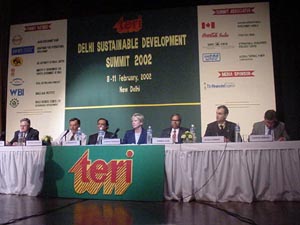
Numerous global environmental agreements
exist, but without a common approach andgovernance structure. The lack of
appreciation/integration of environmental concerns in economic policy making reflects in
the failure of the development process to take into account issues of sustainability,
especially environmental. The reasons cited include structural weaknesses; lack of
cultural sensitivity; lack of attention to economic concerns (poverty alleviation and
market failures); serious political roadblocks in developed/ developing countries; and
financial limitations.
Consequently, the North–South divide has
widened. The failure of translating Rio’s recommendations into actual capital flows
from North to South has resulted in the perception that developed countries lack the
political will to financially commit themselves to sustainable development.
The argument traditionally put forth to
explain the lack of sufficient emphasis on environmental issues in broader policy
encompasses drawbacks like the absence of (1) a coordinating framework like a World
Environmental Organization and (2) adequate financing for ‘green’ initiatives.
Better coordination between stakeholders, including international environmental
institutions, private and public sectors, and civil society is crucial to ensure the
integration of environmental, economic, and social concerns. Since good governance must
catalyse such synergy, it should be accepted as the fourth pillar of sustainability.
One deliverable at the WSSD should certainly
be larger funding for environmental agencies. However, aid can only supplement other
resources and catalyse actions. More than a financing option, it is indeed a necessity to
facilitate reforms. Multilateral institutions must be sensitized and private sector funds
should be leveraged. The role of innovative financing mechanisms, like the clean
development mechanism and Tobin Tax, is critical. Indeed, there is increased emphasis on
private sector participation in the WSSD—a step up from Rio. Environmental
accountability must be ensured in private investment flows. In the post-Rio scenario, this
has been highlighted by re-emphasizing the need for ‘good governance’, not just
institutional reforms. In competitive markets, governments must introduce effective
regulatory measures to correct market failures and ensure social sustainability in a
transparent, participatory manner.
Decision-making processes must be
decentralized and participatory but in tandem with rapid globalization and attendant
environmental concerns. Legislative and regulatory frameworks must be supported by
appropriate incentive structures. This calls for good governance at the local, national,
regional, and global levels. Apart from greater capital flows into developing countries,
the potential of greater labour flows from the developing world could be considered to
improve productivity in both the worlds. Lack of cultural sensitivity and of concern for
poverty alleviation is important. Environmental agencies worldwide must facilitate overall
development rather than limit efforts to their focus areas. Broad use of an environment
and development fund would help tackle such problems.
The expectations from the Rio process must be
tempered and rationalized. We hope that the WSSD would focus the attention of key
policy-makers on real issues of sustainability; provide a forum for truly coordinated
decision making; and further the understanding of policy planners and civil society
towards ensuring genuine, universal sustainable development.
|